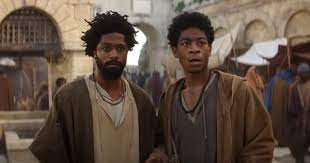The Book of Clarence 2024 Movie Review
The grand-scale Biblical epics that midcentury Hollywood churned out to roaring box-office returns had many drawcards as (so to speak) mass entertainment — brawny action, transporting spectacle, then jaw-dropping effects — but a sense of humor, by and large, wasn’t one of them. That’s something British musician-turned-filmmaker Jeymes Samuel attempts to rectify in his offbeat messiah story “The Book of Clarence,” a newly invented tale that runs parallel to the life and death of Jesus in ways both blithely blasphemous and sincerely Christian. Following on from Samuel’s debut, the rollicking hip-hop western “The Harder They Fall,” with its flagrantly anachronistic remix of genre traditions and a predominantly Black cast, “Clarence” clearly seeks to be the first film loosely of its type to make any pop-cultural impact since Mel Gibson’s “The Passion of the Christ” nearly 20 years ago.
It’ll certainly prove a hard sell to the U.S. audience that conventionally turns up for faith-based fare — people who tend to prefer their Bible stories without four-letter words, disco dance interludes and atheistic, weed-smoking heroes. Whether “The Book of Clarence” can woo a younger, hipper, more secular crowd will depend on viewers’ receptiveness to its peculiar tonal lurches: As its eponymous protagonist gradually finds faith, Samuel’s film increasingly ping-pongs between the puckish and the pious, though the rugged confidence of the filmmaking is a constant. Sony will find out how the gamble pays off when it releases the film on January 12 next year, three months after its world premiere at the London Film Festival.
From its kinetic opening scene — a helter-skelter chariot race along the cliffside dirt roads of Jerusalem that nakedly cribs multiple shots from William Wyler’s version of “Ben-Hur” — “The Book of Clarence” makes no bones about the cinematic company it aims to keep, even as it thumbs its nose at the pale staidness of its forebears. The racers are Mary Magdalene (Teyana Taylor), here given a kickass one-of-the-boys makeover, and Clarence (LaKeith Stanfield), a luckless ne’er-do-well who has never attained the social standing of his smarmy twin brother Thomas (also Stanfield) — you know, the Apostle. (The year, in case you were wondering, is 33 A.D.)
Losing the race to Mary Magdalene also means losing a substantial bet to ruthless local gang leader Jedediah (Eric Kofi Abrefa), whose sister Varinia (Anna Diop) happens to be Clarence’s crush. Our man needs shekels, and fast. An avowed unbeliever, he’s nonetheless wise to the clout that God’s supposed human channels wield in society — particularly Jesus, at that point the talk of the town. How hard can it be, Clarence reasons, to fashion himself as a new Messiah? Though he gets no credence in this regard from a scowling John the Baptist (David Oyelowo, in a droll cameo), his friends Elijah (R.J. Cyler), Zeke (Caleb McLaughlin) and Barabbas (Omar Sy) are willing followers, and in no time Clarence’s fakery is making waves — and money — in the community. His scheme, however, proves ill-timed at a moment when Pontius Pilate (James McAvoy) and the Roman army are taking a hard line against miracle-workers, genuine or otherwise.
“The Book of Clarence” is at its most lively and enjoyable when Clarence — played by Stanfield with an easy, raffish charm that lightens the film’s more contrived subversions — is bluffing his way to divine status, and the denizens of Jerusalem resemble the rogues of Damon Runyon’s New York, sackcloth robes notwithstanding. Samuel is evidently enamored of this ahistorical world he’s built, making ample time for leisurely, incidental comic explorations within it: a hookah café where patrons, high on exotic but very familiar-looking “lingonweed,” literally float on air, or an indoor nightclub where hips collectively shimmy to The Jones Girls’ “Nights Over Egypt.” All this irreverence is lent a honeyed, stone-cast grandeur by production designer Peter Walpole and the locations of Matera, Italy; DP Rob Hardy likewise shoots for muscular, ochre-hued classicism — albeit disrupted by the occasional somersaulting camera move — to amplify the contrast between old and new schools of storytelling.
Samuel is on less sure footing in the film’s third act (or “book,” as onscreen titles declare), as Clarence, falling victim to persecution, comes to see the light — and serves as a kind of Christ proxy through a familiarly grueling arc of suffering and redemption. Neither the character nor the film have, to this point, worked up quite enough gravitas to pull off a suddenly straight-faced conversion narrative, and there’s something oddly unmoving about Samuel’s most effortful stylistic pushes for grace, supplemented by one too many earnestly spiritual ballads written and performed by the director himself — breaking form on a soundtrack that otherwise revels in the clash between slinky funk beats and vintage-style Hollywood orchestration.
A sly character reveal in the late stages (playing on the mainstream conception of Jesus as a white man with flowing chestnut locks) is clever, adding a further layer of irony to Clarence’s plight — albeit a little rushed, at some cost to the film’s satirical impact. Some might say that an essentially faith-based film shooting for the no-sacred-cows comedy of “Monty Python’s Life of Brian” amounts to having your five loaves and two fishes, and eating them all. But Biblical cinema could use more messengers with Samuel’s eccentricity and daring, alive to the limitations and biases that have hitherto made for such a stylistically uniform genre. At Clarence’s lowest ebb, his mother (Marianne Jean-Baptiste, underused but ever-welcome) offers him some counsel. “Be the body, not the shadow,” she says. “Hold space.” Samuel takes heed.




